How to overcome (beat, defeat) (mental, severe) depression (without medication) | How can I (you) overcome depression? | What are the ways to overcome the depression? | What are 3 ways to help treat depression? | How do most people overcome depression? | Can you help me overcome depression?
Hello friends, how are you doing today? Welcome to #Relationships-Parenting website / blog.
Let you and your well-wishers live a happy and prosperous life through out your life term.
In this website / blog, you will always learn about #Relationships #Parenting.
Also subscribe / follow to our various social media networks from here to learn more about #Relationships #Parenting:
Just before going to “How to overcome (beat, defeat) (mental, severe) depression (without medication) | How can I (you) overcome depression? | What are the ways to overcome the depression? | What are 3 ways to help treat depression? | How do most people overcome depression? | Can you help me overcome depression?“, let us know a brief, basic and very important information.
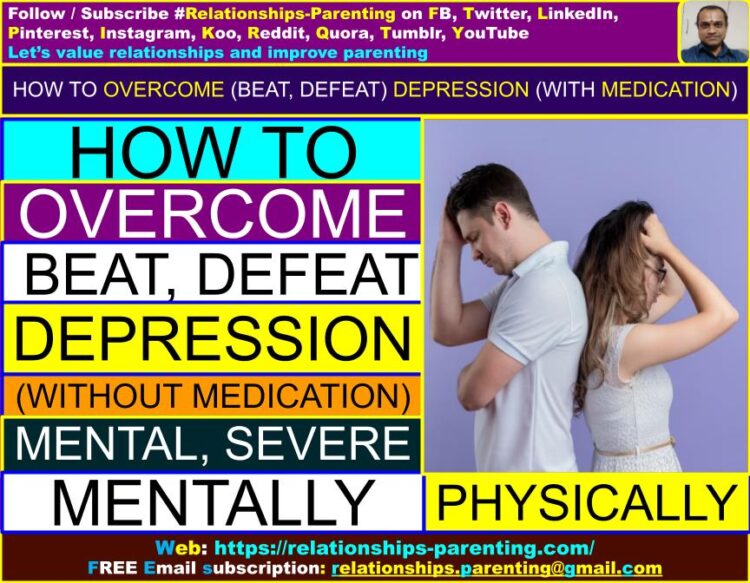
Definition of depression : Depression is a common disorder that affects about 5% of the world’s adult population.
It is characterized by persistent sadness and a lack of interest or happiness in previously rewarding or enjoyable activities. Depression in many cases disturbs appetite, digestion and sleep.
Main (major) causes (reasons) of depression is as given below:
Conflict : Often, the result of ongoing inner unresolved conflict can lead to emotional turmoil or pain (mental), guilt or shame, isolation or desperation. Older unsettled internal struggles can lead to dark moods and low self-esteem. Eventually, depression can also set in.
Being unemployed : Good mental health has a major impact on employability, finding a job, and staying in that job.
Unemployment causes stress, which ultimately has long-term physiological health consequences and can have negative effects on people’s mental health, including depression, anxiety and low self-esteem.
Being not beautiful : Worrying about your imperfections can make you feel depressed and anxious. It can also trigger unwanted thoughts in your mind. The main cause of depression is frequently checking your reflection in the mirror or avoiding the mirror altogether.
Losing someone you love the most : When someone very close to us dies or moves away (E.g., divorce etc.) from us, it can cause a major form of depression, either short-term or long-term.
Sad heart attack increases blood pressure and risk of blood clots. Stress connects the emotional and physical aspects of grief.
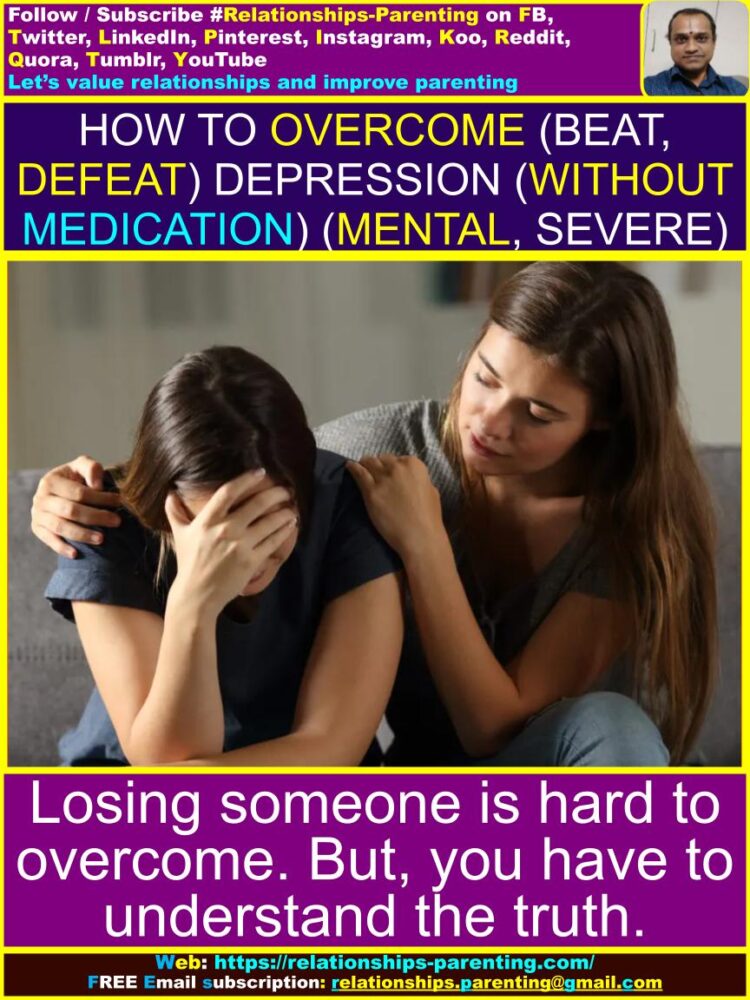
Gender depression : Hormonal changes that women go through at different times in their lives play a role. Hormonal changes during menopause can affect physical health as well as mental health.
Women may experience feelings of anxiety, stress or depression. Menopause symptoms may include: anger and irritability.
Students getting lower grades : Depression is associated with lower grade grades, and research suggests that co-occurring depression and anxiety may exacerbate this relationship.
Dropping out of school is associated with depression. Many college students report that mental health problems interfere with their studies.
Physical and mental abuse : Both short-term and long-term physical and mental abuse can significantly affect the entire trajectory of a person’s life, making them feel worthless, hopeless, helpless, and losing enjoyment in daily activities and engaging in self-suffering. All these are common symptoms of depression.
Chronic illness : Depression is one of the most common complications of chronic and serious illness. It is estimated that one-third of people with a serious medical condition have symptoms of depression. People with chronic illnesses must adapt to both the illness and its treatment.
Substance misuse (abuse) : Substance misuse (abuse) is a serious public health challenge. This includes the use of illegal drugs and the inappropriate use of legal substances such as alcohol and tobacco.
Whether through overindulgence in alcohol, abuse of prescription drugs or use of illegal drugs, such abuse can be harmful to our health with depression.
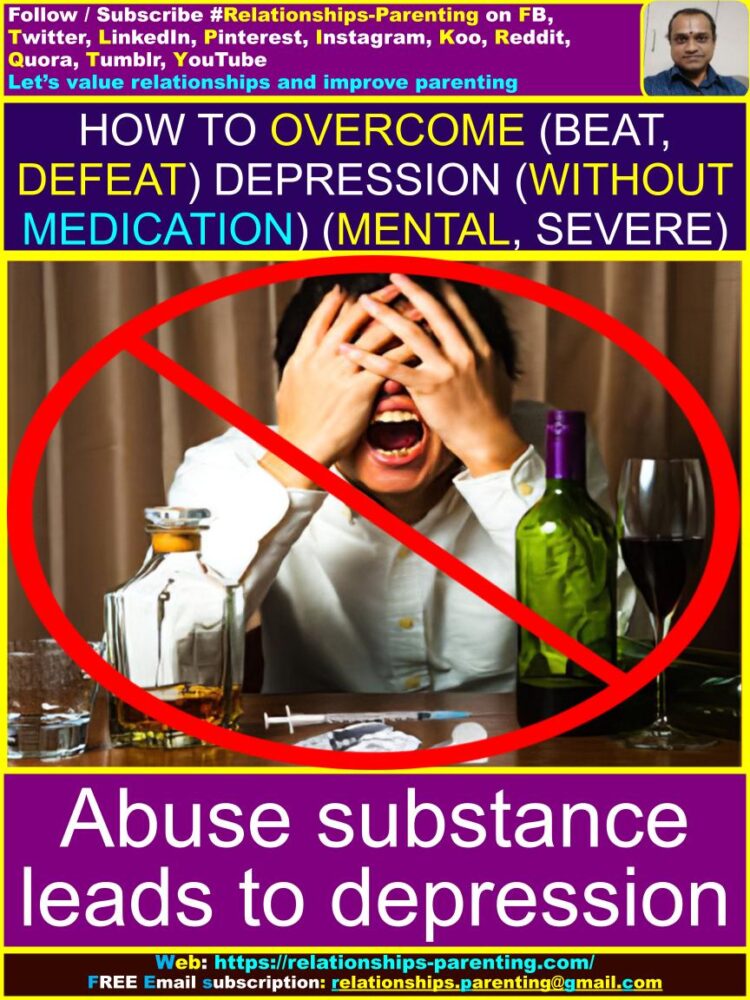
Others (Personal problems) : Problems such as social isolation from other mental illnesses or being ostracized from family or friends or a social group can contribute to the risk of developing clinical depression.
List of about “How to overcome (beat, defeat) depression (mental, severe) | How can I (you) overcome depression? | What are the ways to overcome the depression? | What are ways to help treat depression? | How do most people overcome depression? | Can you help me overcome depression?” is as given below:
Avoid taking things personally : When we look at other people without taking them personally, we are never hurt by what they say or do. It doesn’t matter if others lie to you. They are lying to you because they are afraid.
When you don’t take anything personally you get a great deal of freedom. If you take things personally, you may spend hours or days dwelling on what happened, unable to learn from the situation and move on.
Taking things personally is exhausting and overwhelming and contributes to negative, self-limiting beliefs, preventing you from pursuing your goals and achieving success in your life.
When we don’t take things personally, it gives us more power over our thoughts, feelings and actions. When we don’t take things personally, we recognize the individuality of others, their uniqueness.
Thus finally we accept that other people are different from us. Remember, all are different and unique in their own ways.
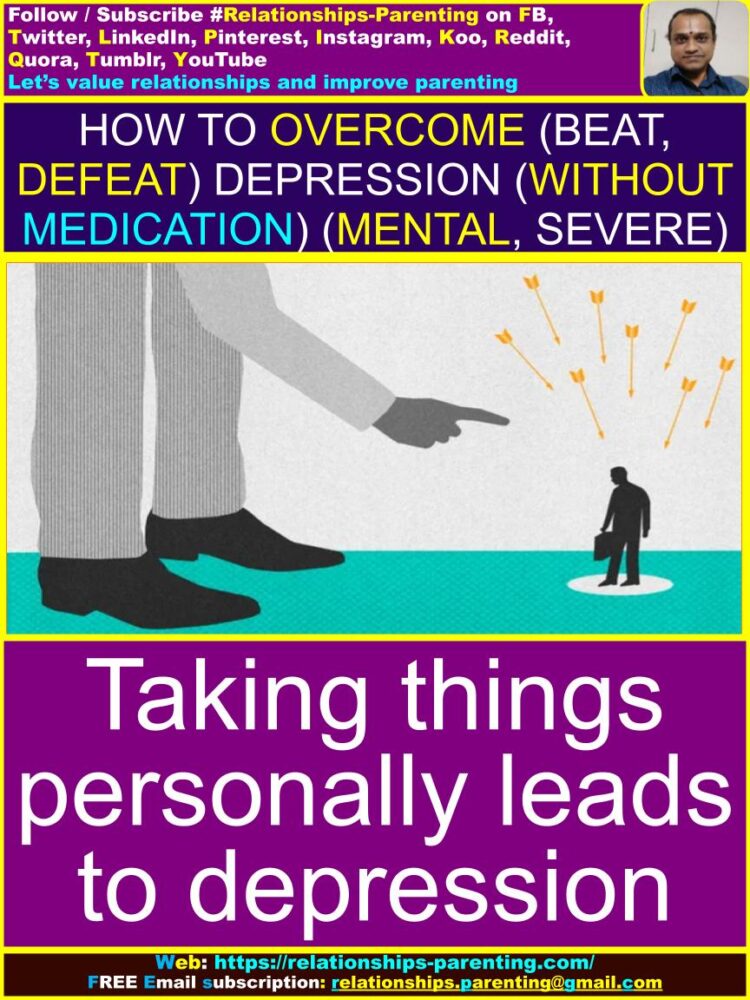
Think right before over thinking : Overthinking is when you worry or worry about the same thing over and over again. People who overthink can become paralyzed by their worries and struggle to make decisions or take action.
Overthinking can cause and contribute to depression, anxiety and other mental health disorders. Overthinking is often associated with generalized anxiety disorder (GAD).
GAD is characterized by a tendency to worry excessively about many things (yourself and others). Someone can develop GAD because of their genes or personality factors such as an inability to tolerate uncertainty in life.
This can lead to depression. Positive and right thoughts help you see the bright side of a problem and challenge. You may begin to appreciate your own strengths as you navigate difficult situations.
Positive thinkers see setbacks as temporary, making them less likely to fall into despair when one or more obstacles present themselves.
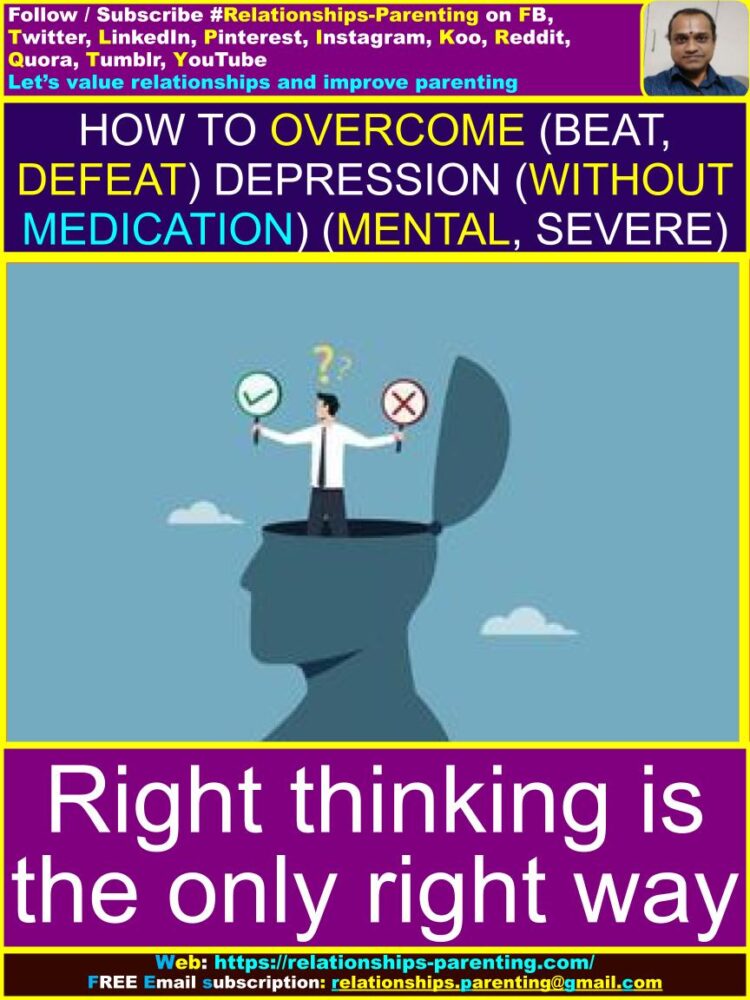
Do clear and effective communication : Any relationships built on a solid foundation of good, clear and effective communication are stronger and can help people find opportunities for personal and other growths.
At a basic level, good communication builds trust and is particularly effective in improving life in different ways.
When you work with many people (family, friends, office, school, college etc.) with same or different goal(s), a clear, good, effective and direct communication strategy increases productivity and speeds up problem-solving by reducing misunderstandings and confusion.
This helps your to overcome depression. Understanding why people feel the way they do is the basis of empathy. When we become active listeners, we enhance our personal and professional relationships through greater understanding of the people around us and their perspectives.
In simple words, make clear, friendly, good, direct and effective communication for a depression-free life.
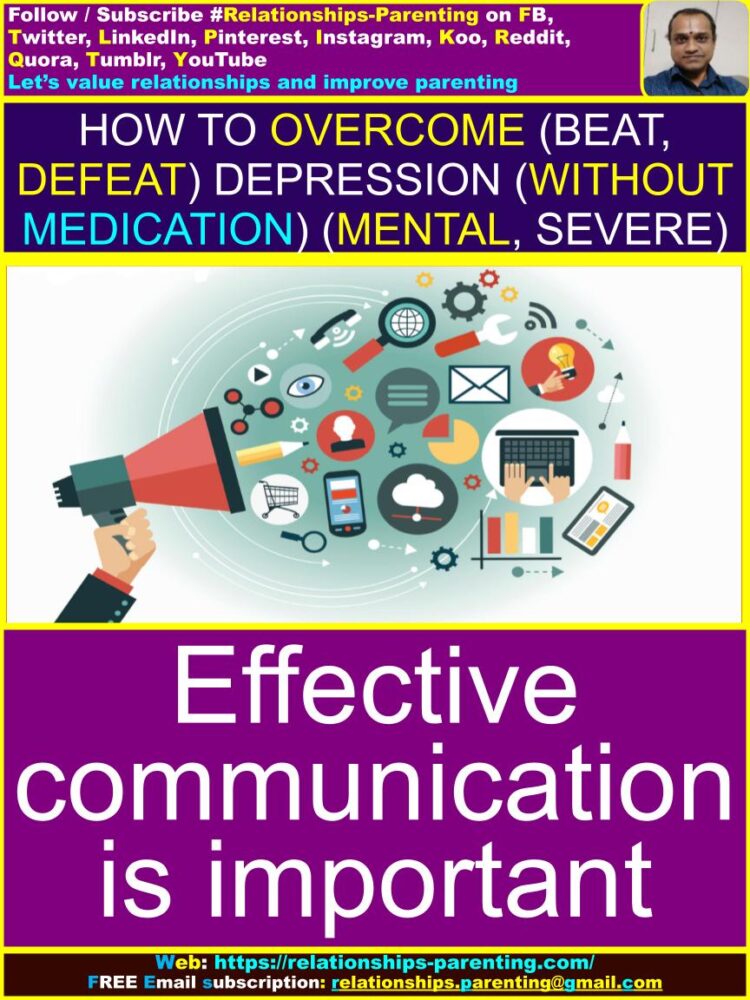
Completely avoid drugs, smoking, alcohol : Prevention and early detection and intervention strategies can reduce the impact of substance use and mental disorders.
Prevention activities provide education and support to individuals and communities to prevent drug use, smoking, alcohol. All medicines are basically poisons so there is no medicine without some harmful side effects.
Exact effects vary by drug. Heroin or painkillers suppress lung function and can cause tuberculosis, pneumonia or abscesses.
Marijuana causes changes in the brain similar to those that occur with schizophrenia, not to mention damage to your lungs. Methamphetamine is very hard on the whole body, especially the nervous system and brain.
Heavy use of multiple drugs or alcohol leads to severe weight loss and malnutrition, which can affect one’s ability to resist illness. So, to avoid all these you need to quit all these things immediately.
Benefits of quitting drugs, smoking, alcohol – Improve your physical and mental well-being, reduces the risk of temporary or permanent damage to vital organs and death, improve your relationships with friends and family, you can enjoy life with your gf or bf (wife / husband),
helps you reconnect with your emotions, connects with positive people, increases your energy, help with good and sound sleep, improve your look, skin starts to glow more, save your money and mainly you will be able to be happy and can enjoy life more than ever 🙂 . What more you need?
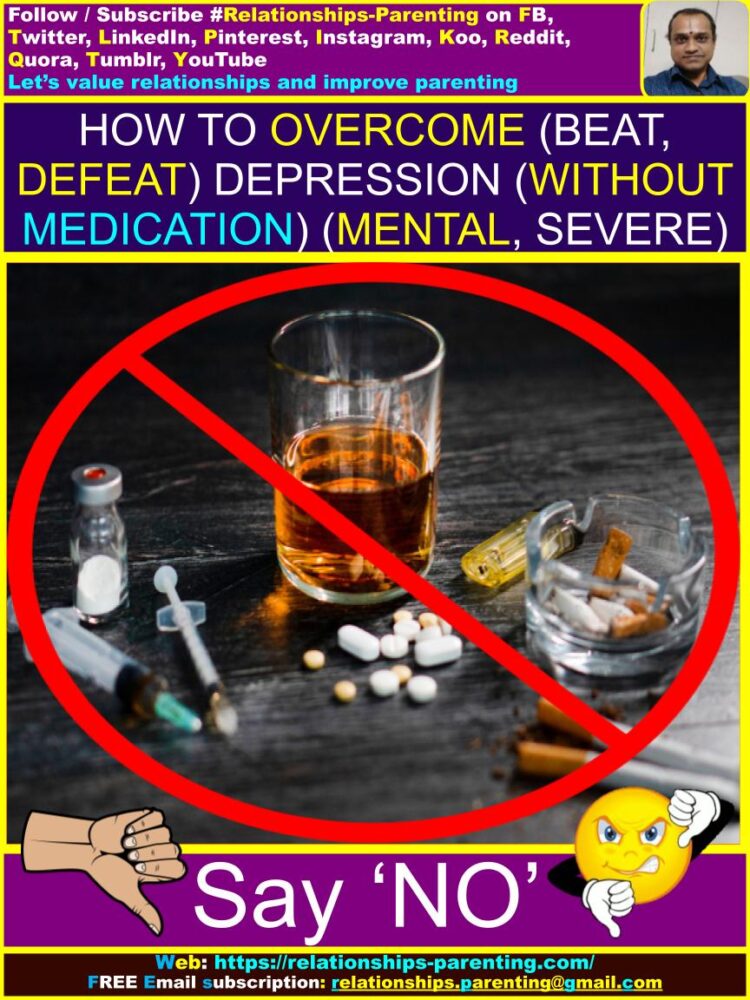
Spend quality time with loved ones : Studies of community samples suggest that spending quality and more time with family members (loved once) is associated with lower levels of depressive symptoms in all (especially with the adolescents).
Emotional support, encouragement, contentment and validation from loved ones (e.g., family) are essential to maintaining positive psychological well-being.
When family members feel heard, understood and loved, it increases their sense of belonging and self-worth, reducing the risk of problems such as depression and anxiety.
When we spend quality and more time with family, especially when we have face-to-face interaction, as opposed to digital, it significantly reduces the incidence of depression, anxiety, and other mental illness. Being physically present with loved ones creates strong emotional support to cheer you through life’s challenges.
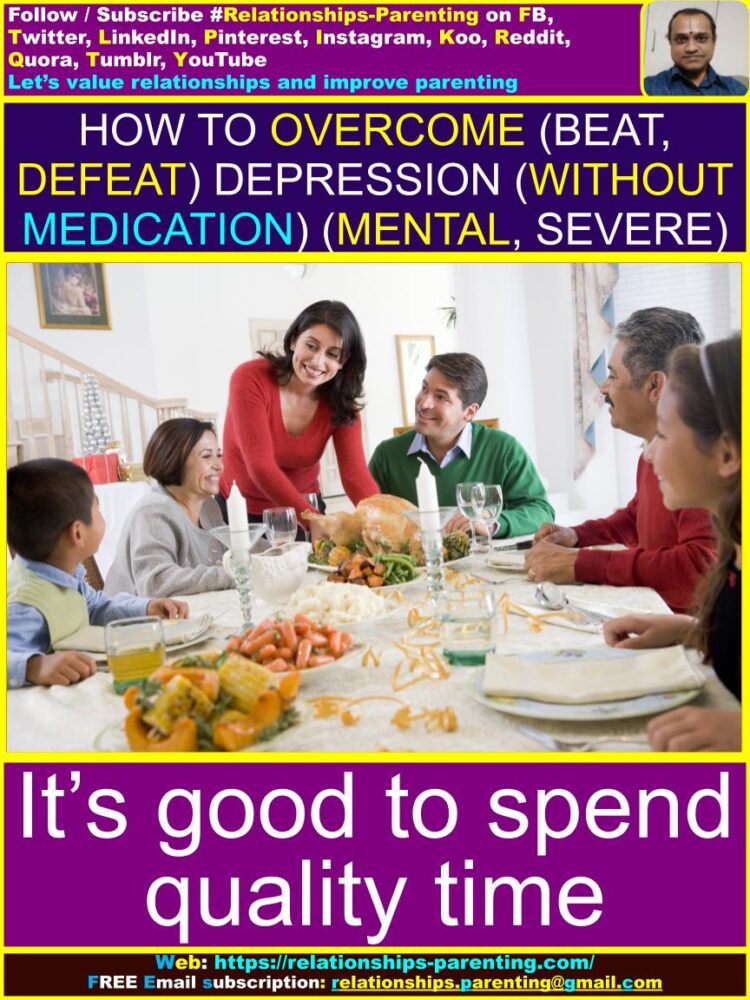
Serve and help others : Doing good deeds for others can help people feel a greater sense of purpose or influence over others, which is important for people suffering from symptoms of anxiety or depression.
You understand that people appreciate you, people enjoy spending time with you. Evidence shows that helping and serving others can also benefit our own mental health and well-being. For example, it reduces stress and improves mood, self-esteem and happiness.
There are many ways to help others as part of our daily lives. Good deeds don’t take much time or cost any money. For example, volunteering, helping and serving others helps us feel a sense of belonging, make new and good friends, and connect with our communities.
Face-to-face activities like volunteering at a food bank can help reduce loneliness and isolation. This will automatically reduces the depression in you.
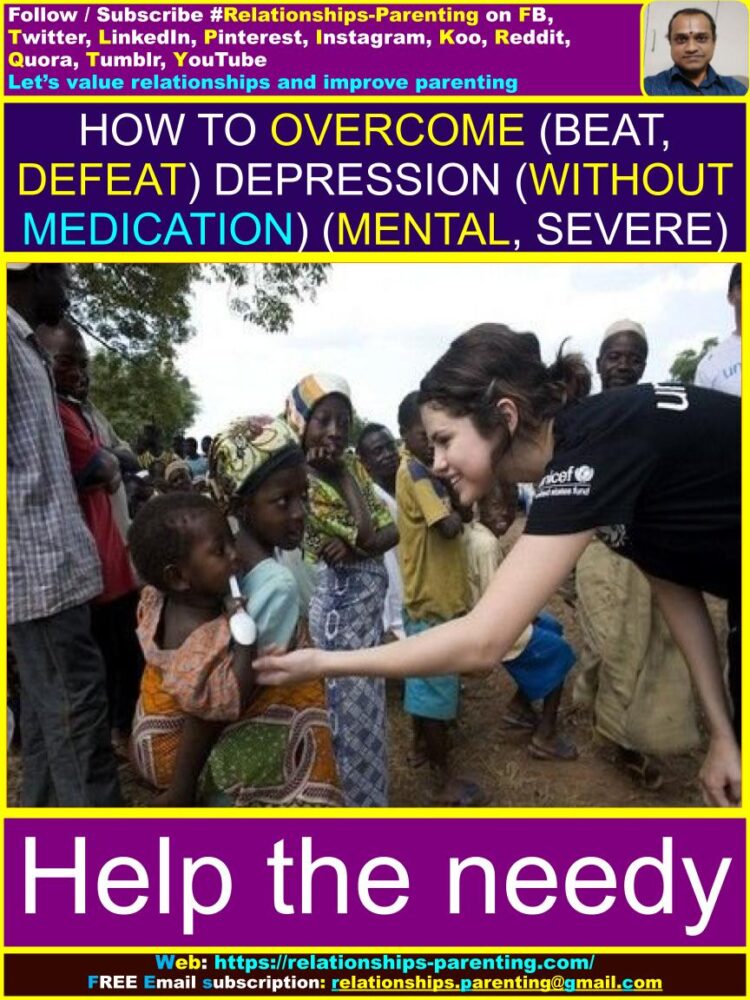
Sleep at 10 and wakeup at 6 : Sleeping around 10 p.m. is excellent for your health both physically and mentally. Researchers say that falling asleep around 10 p.m. is the best time for your and your family’s heart health.
They say the optimal bedtime is well-adjusted to circadian rhythms and daylight. It is regulated by the interaction between the pineal gland in the brain and the light levels in our environment.
Working against it can affect hormones and biology. People who go to bed around 10pm are less likely to suffer from chronic fatigue, thyroid problems and burnout. 6 am is the best time to wake up in the morning.
You have plenty of time to get ready for your day without rushing and you can still enjoy a peaceful morning with healthy breakfast. If you are not a morning person, waking up early can be difficult. But with few tries, you can achieve it.
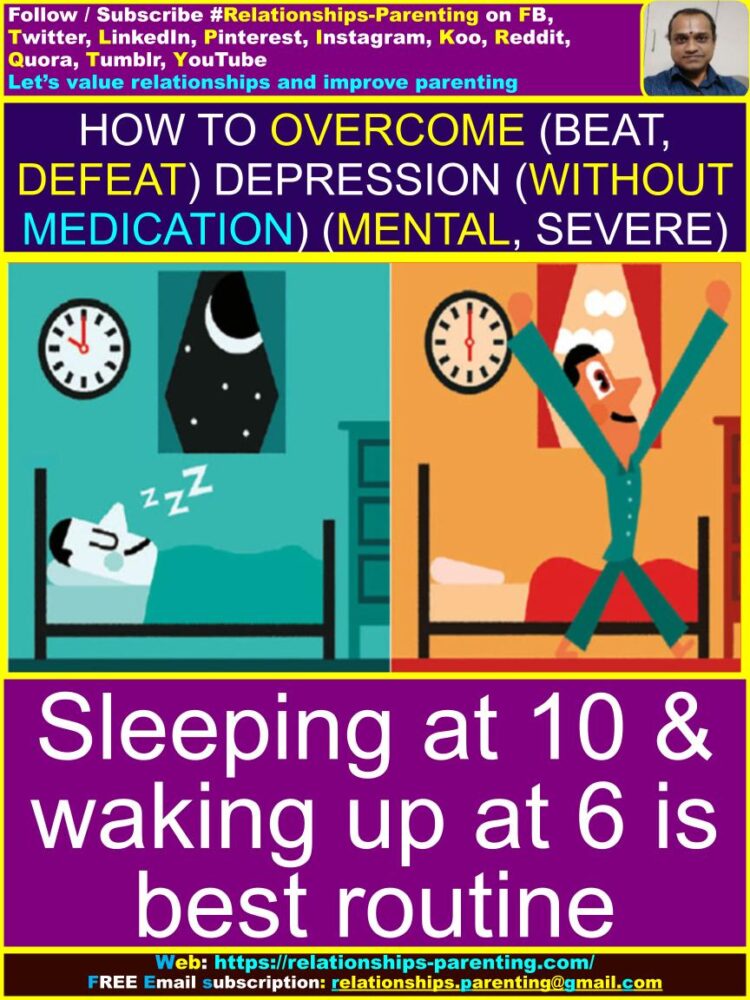
Always be optimistic : Life is not the same for everyone. Your life is different and other people’s lives are different. You like something and others may or may not live according to your wishes.
Don’t worry too much about those things and always be positive and optimistic. Life is full of ups and downs. Always be cheerful, confident and hopeful. It turns out that an optimistic attitude can help us be happier, more successful, and healthier.
Optimism protects against depression – even for people at risk. An optimistic outlook makes people more resistant to stress and depression. Optimism can help people live more happier and healthier life. Optimistic people are happier people.
Because they see things from a bright and positive side, thus, they always feel happy and satisfied. An optimist sees even the smallest things in a positive light. For example, saying a simple “good morning” is a great way to cheer others up.
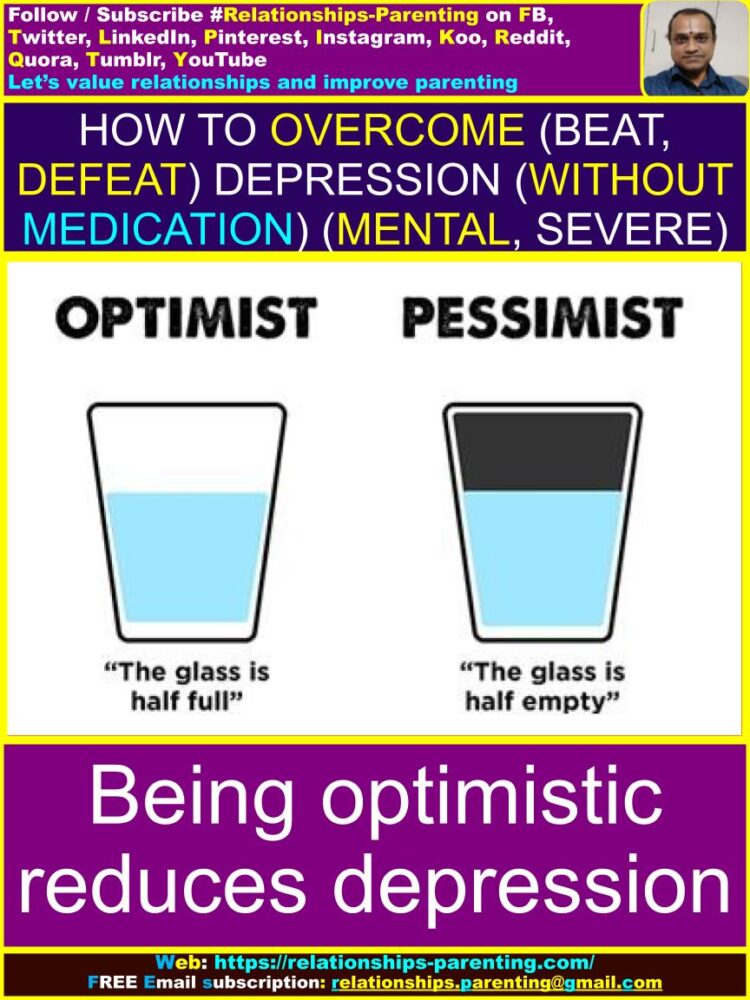
Stay focused on your goals : No matter where you are on your mental health journey, working toward your specific goals can help you live the life you want while managing your mental disorders.
Keep thinking about your dreams and visualize them every day. Repeat in your mind words and sentences that inspire and motivate you. Once you set a goal, you can set milestones to achieve it.
This is especially helpful when you have a big goal to achieve. Setting milestones helps you stay focused by breaking a big goal into smaller, more achievable goals.
For example, if you set a goal to start a small business by the end of the year, you might set milestones for writing a business plan, getting investors, and launching a website.
Setting goals can help spark new behaviors, help guide your focus, and help keep that momentum going in life. Goals help align your focus and promote a sense of self-mastery.
In the end, you can’t manage what you don’t measure and you can’t improve anything you don’t manage well.
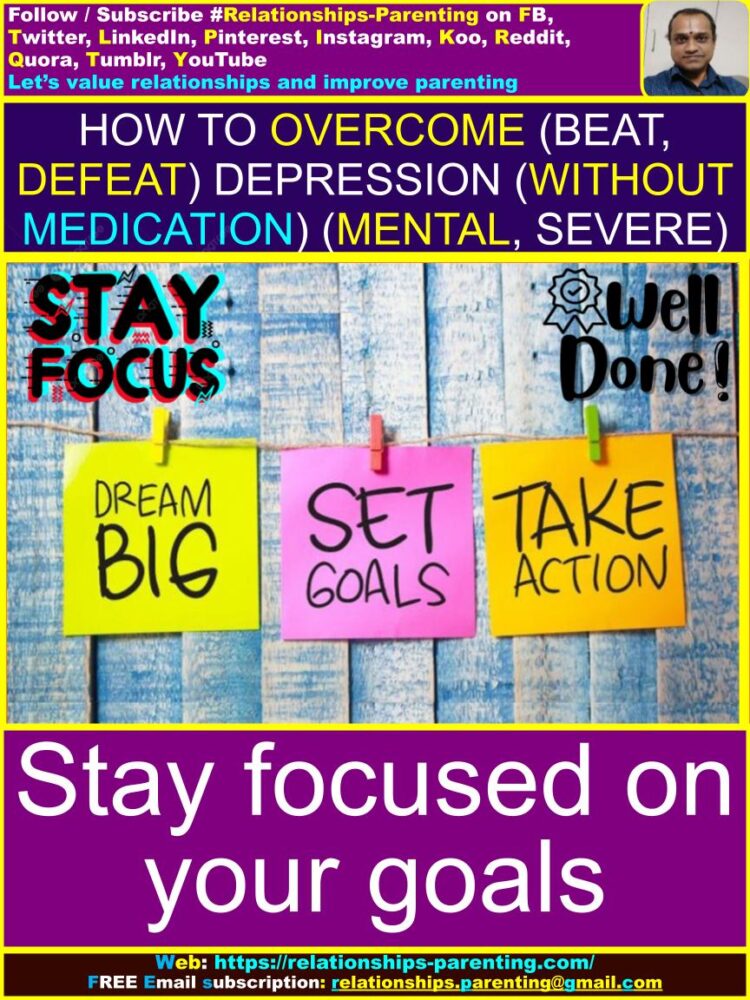
Take responsibilities : Accepting responsibility gives you the power to make positive changes in your life. You can identify things you want or need to do and put them on your list.
Identifying the necessary good behavior items and putting them on your list will help you achieve the specific changes you want to make in your life.
Giving love and care to your spouse, parents and children can help you overcome depression. Likewise, providing moral guidance to children and youth can help you fight anxiety. Do the dishes and straighten your room.
If you can do what needs to be done without being asked, you look very responsible. Taking responsibility gives us satisfaction and satisfaction that we have done our best.
Even if the outcome is not what we expected, knowing that we are in control and there is nothing we can do gives us peace of mind and depression free life.
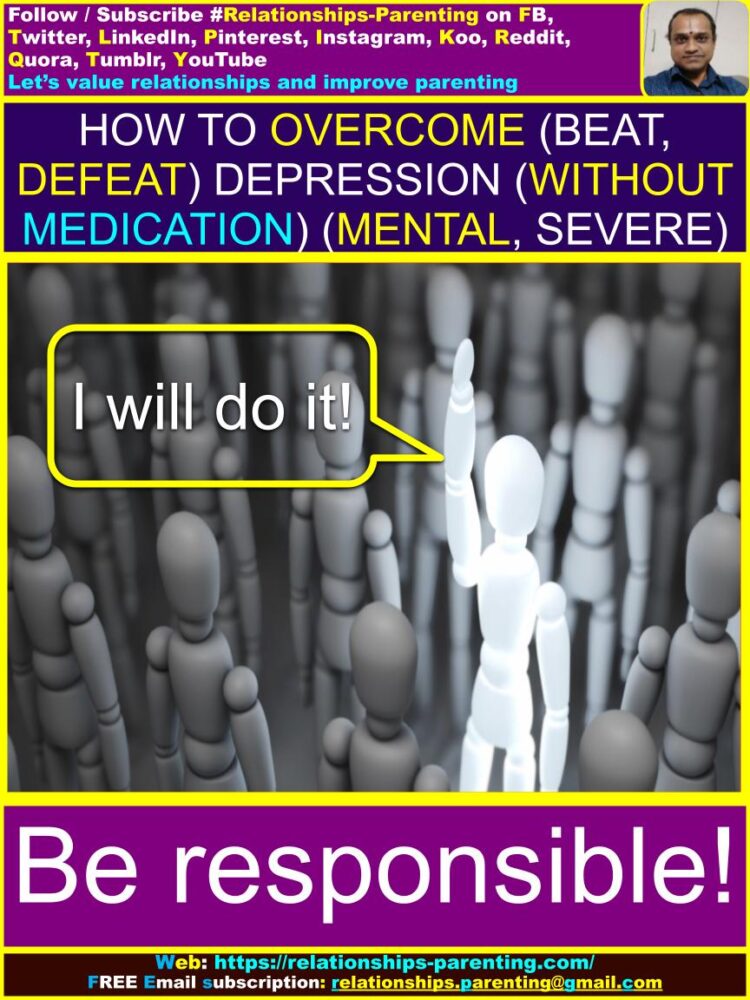
Challenge your negative mind : While everyone experiences negative thoughts frequently, negative thinking can seriously affect the way you think about yourself and the world and interfere with work/study and daily functioning, which can be a symptom of a mental illness such as depression, anxiety disorders, personality disorders.
Don’t say anything to yourself that you wouldn’t say to someone else. Be gentle and encourage yourself.
If a negative thought enters your mind, evaluate it rationally and affirm the good things about yourself. Think about the things in your life that you are grateful for.
Benefits of staying positive – increased life expectancy, lower rates of depression, lower levels of distress and pain, greater resistance to disease, better mental and physical well-being,
you can enjoy eating your favorite food, you can laugh loudly, you will feel light hearted, better cardiovascular health and reduced risk of death from cardiovascular disease and stroke,
reduced risk of death from cancer, reduced risk of death from respiratory conditions, reduced risk of death from infection, better coping skills during hardships and stress, etc.
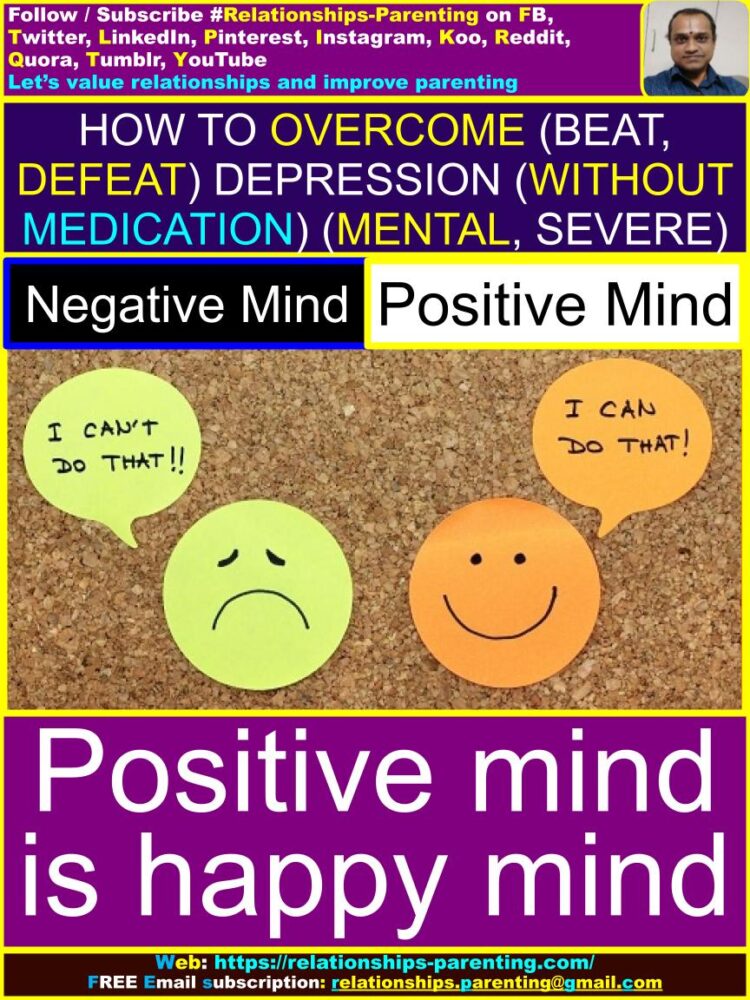
Enjoy what you do, do what your enjoy : If you can truly love what you do, it’s the easiest way. If you can’t, by all means don’t settle and change to do what you love.
Doing something you love and believe in makes you a better person, and everyone around benefits from another person working with passion.
Whatever your preference maybe, research shows that when you engage in interests you enjoy, you’re more likely to have lower stress levels, depression free life, a lower heart rate, and a better mood.
You are likely to be involved in the world around you. But, that doesn’t mean you can do whatever you want. You should give importance to your family, friends and others while doing what you love.
It should not harm others physically and mentally. Sometimes you may want to do something, but it may hurt your family’s feelings. You should be careful while choosing it.

Eat together and eat healthy : Social eating behavior is associated with a reduction in depressive symptoms with all (especially with adolescents) and may be due to the protection and support they receive from family/peers.
Sharing a good and healthy meal with family and friends also improves communication with peers/family, which has a positive effect on anxiety and depression.
Eating healthy food with family increases self-esteem and resilience in children and adolescents and reduces the risk of depression in all.
Since anxiety and depression are common in children of all ages, eating together is a simple and effective way to curb those risks.
Benefits of eating healthy food together – Eating together promotes healthy eating habits, can help prevent mental health disorders, can prevent adults’ weight struggles, can improve children’s self-esteem, can improve communication skills, can complement family therapy etc.
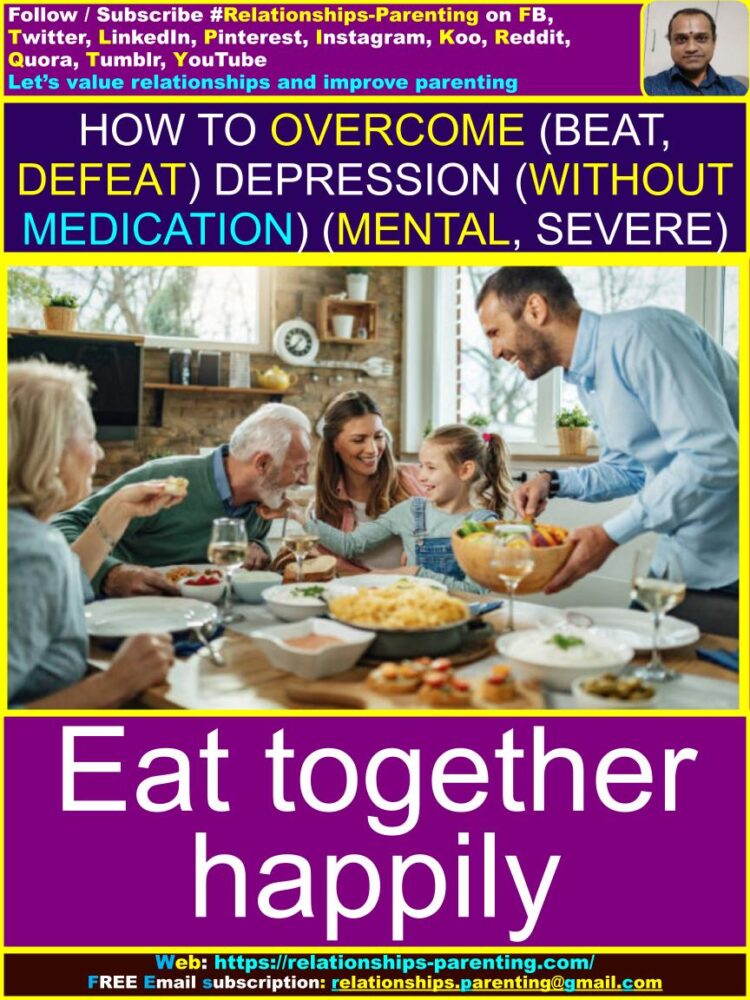
Do meditation, yoga : Yoga is a gentle exercise that involves meditation and controlled, physical movement. Focusing on deep breathing and stretching your body can be effective in relieving symptoms of depression, such as sleep problems, pain and loss of energy and off course depression.
Physical exercise is good for you, but depression and anxiety can zap your energy and make it hard to be active. Yoga is another way to get movement into your routine and get better.
In general, the benefits of yoga may include less depression, less stress, lower heart rate, and lower blood pressure. Yoga can be prescribed as a monotherapy for depression, but is preferred as an adjunctive therapy for anxiety and depression.
The optimal frequency and duration is unclear, but studies have shown symptom reduction if you do Yoga for about 30 to 60 minute everyday (Five – Six days a week).
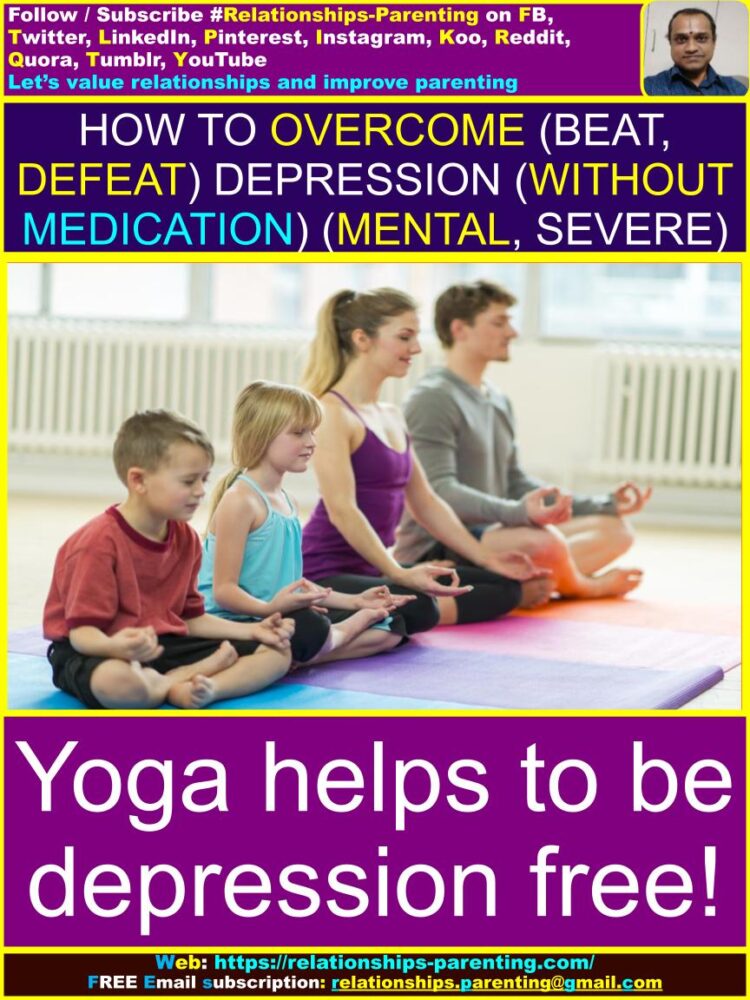
More information will be added to this on regular basis. Please visit this post and blog / website to know more about relationship and parenting.
Continue reading about:
To know more about “Husband and wife information, facts“, please click the below link:
Husband and wife information, facts
Dear friends, if you need any clarifications about this post, kindly let me know, I will definitely try to answer all of them.
Also add your COMMENT below, SHARE on different SOCIAL MEDIA networks.
This will help to know the quality of this content and also it will be helpful to know if any improvements is required for the content.
If you feel this content is useful to you and has helped you to improve your knowledge, kindly share this with your well-wishers.
Because “SHARING MEANS CARING”.
To receive FREE EMAIL SUBSCRIPTION about #Relationship #Parenting, you can send an email to [email protected] from your email ID.
Let you and your well-wishers live a prosperous, healthy and fearless life through out your life term.